#the georgetown project
Explore tagged Tumblr posts
Text
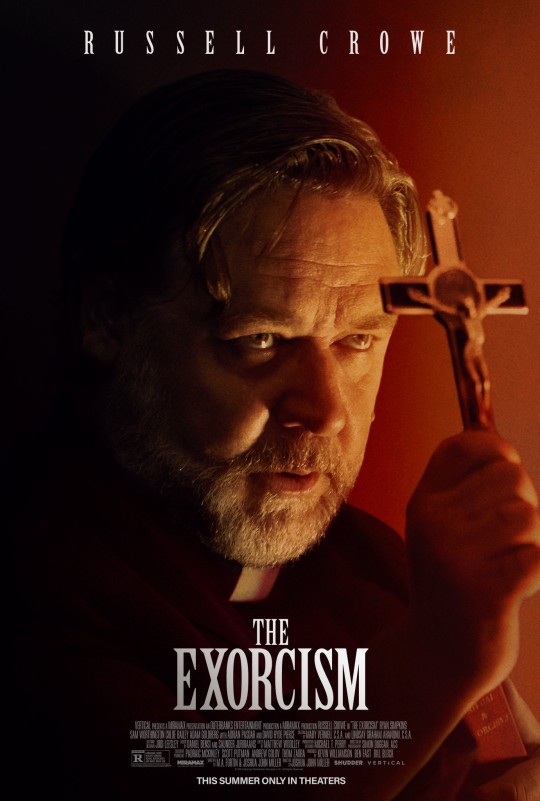
new movie poster for the exorcism (2024)
29 notes
·
View notes
Photo

Georgetown, TX | one of maybe 3 photos that include people in the whole series I made of Williamson County // #georgetown #texas #barber #haircut #men #project #williamsoncounty #filmphotography #documentary #film #mediumformat #hasselblad500cm #ilford #hp5 #filmshooterscollective #texasgirlphotography https://www.instagram.com/p/CpP9REIOW7F/?igshid=NGJjMDIxMWI=
#georgetown#texas#barber#haircut#men#project#williamsoncounty#filmphotography#documentary#film#mediumformat#hasselblad500cm#ilford#hp5#filmshooterscollective#texasgirlphotography
7 notes
·
View notes
Text
"O Exorcismo" com Russell Crowe é um filme amaldiçoado? Entenda.
“O Exorcismo”, terror com Russell Crowe, passou por alguns problemas para ser finalizado, sendo considerado amaldiçoado. Entenda os motivos!
“O Exorcismo” é o novo filme de terror com Russell Crowe, e já está em cartaz nos cinemas nacionais. A produção que tenta fugir do padrão dos filmes de exorcismo, contando uma história que acontece nos bastidores de uma gravação de um filme de terror, passou por alguns problemas até entrar em cartaz. Até o próprio diretor Joshua John Miller, na estréia do filme em Wilmington, Estados Unidos,…
#Filme amaldiçoado#filme de terror amaldiçoado#filme de terror com padre#filme de terror com Russell Crowe#O exorcismo#o exorcismo é amaldiçoado?#o que é The Georgetown Project
0 notes
Text


is that a house of leaves reference.
1 note
·
View note
Note
!!!
You like photography? I love doing that too!!! What are your favorite things to take pictures off??
-🌌
where did you hear that from?? the DUMB pinned post????? do you just see a pretty picture and believe everything underneath it because you SHOULDN'T. because whoever wrote it is a PIECE OF SHIT LIAR with access to my account. i mean--what kind of name is ROME?? that's a city, idiot.
.........anyways that's really cool dude, i really like stealing jodies car and driving to a bigger city to take photos. i like seeing ppl walking abt worrying about things. this one's one of my favorites!!

((OOC: Mandatory disclaimer that I, Mod Rome, took this photo! I do not give permission to scrape this for AI ""art"" or like idk i doubt anyone will do anything with this I just hate AI))
#look at them!#i think the guy biking is biking to work#but he's sooooo pretentious about it#oh my god hes so annoying#“look at me i BIKE to work”#stfu we get it#bc you smell like SWEAT#sunshineposting#ask blog#((mod fun fact i do photography and will be projecting this onto swap!sparrow#((this one was taken on M street in Georgetown DC! ^^#dndads versa
1 note
·
View note
Text
I have such a difficult time connecting with the Cats community now. Part of me feels like maybe I'm too old for the current fandom(I don't feel old, but I'm certainly not 19 anymore). Or that perhaps it's because I don't much care about ships. Sometimes I worry that I intimidate people, and I'd hate that. Let me introduce myself and how Cats has shaped my life, and maybe I can find my people?
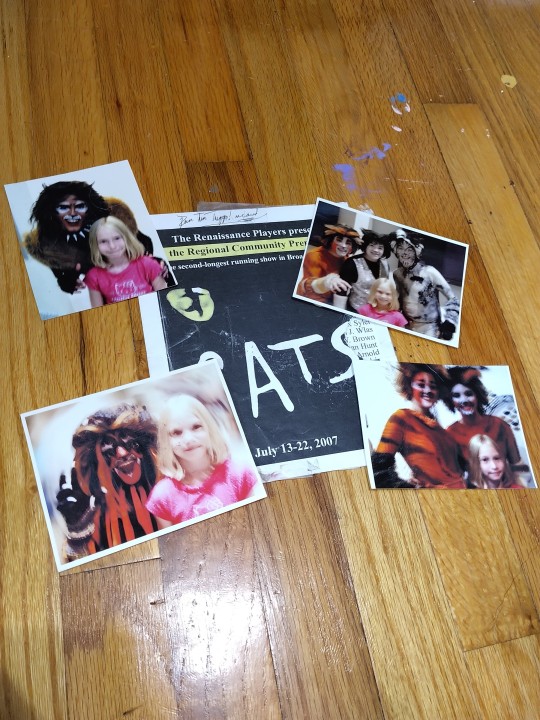
I first saw Cats at a tiny local theatre when I was eight. I fell in love with it, and even though I didn't have the movie yet, I spent months afterwards with just the poem book and highlights album. Eventually I got the 98 VHS too- and then another local theatre put it on when I was ten! I got to see it twice there. And afterwards, I made up my own attempt at a costume, turned our spare room into my attempt at the set, and put some chairs in there to put on the highlights show for some friends of my mother. The CD was worn out, I went on with the show, and they even gave me a card and a new CD afterwards- the London 2 disc set! Looking back, I think how embarrassing it probably was, but I was so happy and proud of myself in the moment. Two more years later, US Tour 5 came through Nashville, and I got to go and stagedoor for the first time. I wore a tail I made and one of the actresses told me I had a perfect Bombalurina tail twirl. For all those years, I worked Cats into school projects, I drew nothing else. My mom put up with it for so long, and I still thank her to this day.
And then I went into middle school. New school, new students, and I started getting bullied for it. I found other musicals I didn't get bullied for- Phantom, Wicked, and Sweeney- to latch onto, and I kinda put Cats in the back of my head. I still loved it, but my hyperfixation had waned thanks to mean kids, and other than occasionally watching the 1998 movie, I didn't think much of it for years.
But the US Tour 6 announced a date in Nashville. I hadn't seen the show in eight years, and I wasn't about to miss it. I had already started taking an interest in cosplay, but I'd never made a costume like that. I remembered admiring the CCDB as a kid though, and I told myself I was totally capable of making my own, just to go see the show in costume. And I did.
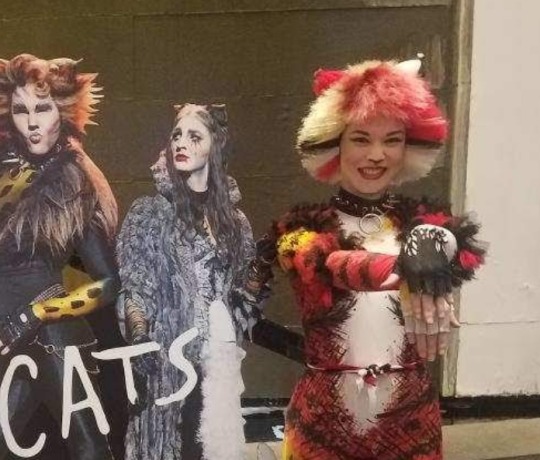
And the cast were SO sweet, and I started finding Cats fans on Instagram. I thought I could do better on the costume, so when the show stopped in Chattanooga a couple months later... I did it again.
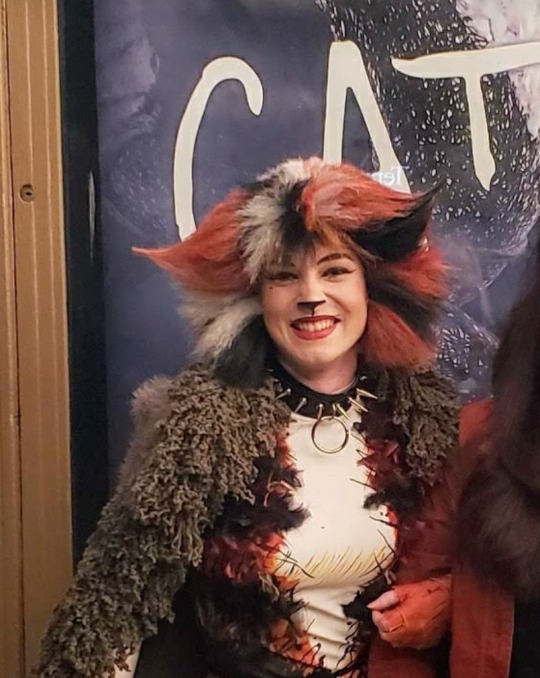
The pandemic hit and I lost my job. Immediately I started getting work making Cats cosplays for others, and I haven't stopped since. And when the show resumed, I made an overnight trip to Memphis to dress up again!
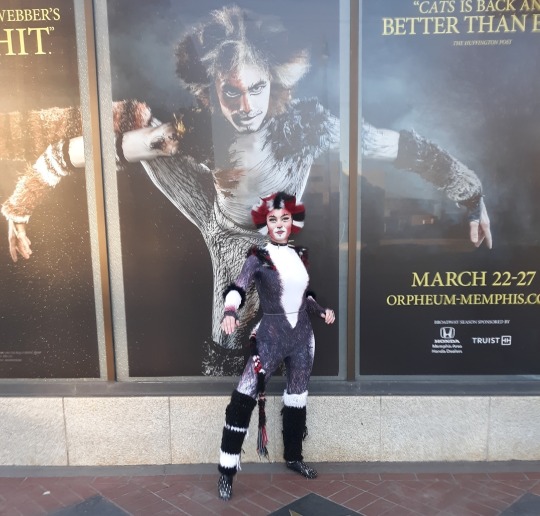
And then, I saved until I could finally go see the Royal Caribbean production (front row all three performances), and got to cosplay on the cruise and get a picture on stage with the cast! This was absolutely everything to me, especially seeing the original choreography as opposed to the revival. I definitely cried. (I'm in the middle bottom row!)
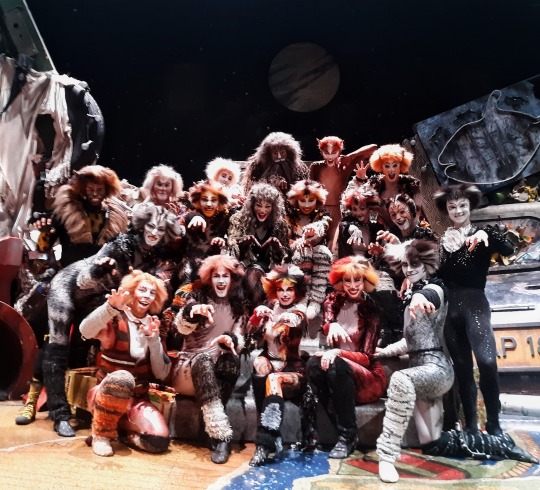
I've gotten to make some costume pieces for three regional productions of Cats, in the Dominican Republic, Atlanta Georgia, and most recently Georgetown Texas. I've won some local cosplay contest with my costumes, too! And I'm lucky enough to own a few original pieces- though I've had to part with some too.
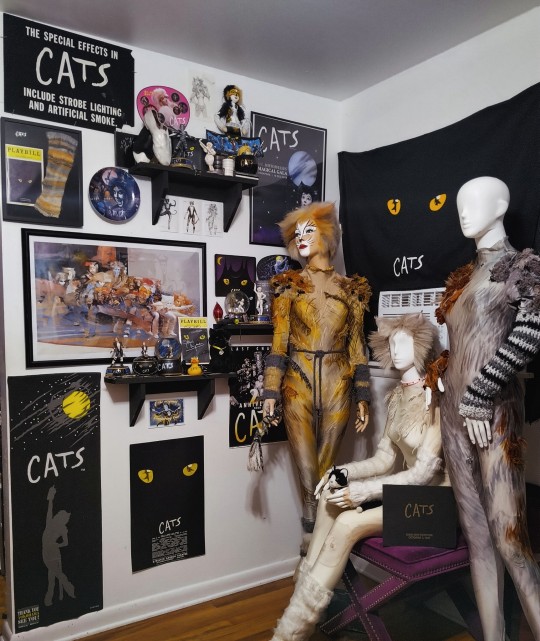
My love for this show has spanned just over 17 years now. I adore the story, the costumes, the choreography, the sets, and the characters. It's part of how I learned I am autistic. It's given me confidence I didn't know I could find. And every time I get to see it live, I feel like I'm where I belong. The fandom has felt quiet. And I'm not sure if that's just because I don't know where I fit in? So here's hoping I can find my tribe.
Favorite productions: Original Broadway, Moscow, and Mexico 2013/2018
Favorite Cats: Jemima/Sillabub, Bombalurina, Demeter, Munkustrap, Tumblebrutus, Jellylorum
Favorite songs: Jellicle Songs for Jellicle Cats, The Song of the Jellicles and the Jellicle Ball, Macavity
Favorite cats to cosplay: Etcetera and Victoria
#cats the musical#cats cosplay#cats the musical cosplay#jellicle cats#cats broadway#cats 1998#about myself
83 notes
·
View notes
Text
I mentioned wanting to write a fic about how things become a little more functional between Simon and August in their 20s, so here’s the scenario I want to write the fic about:
Simon and Wilhelm are close to graduating university. Felice is doing studies abroad in some capacity, and Sara is on the other coast of Sweden. August has just returned from university at Georgetown and is taking up some crown prince duties.
Simon and Wilhelm didn’t go to the same school—they each ended up in a school that fit their study needs—but they’re about 1-1.5 hours apart by train. They try to see one another relatively often, maybe on the weekends. They each have their own set of friends at their own school. In the final semesters of university, Simon gets involved in some particular, career-related project I haven’t decided on yet, which takes up a little more of his time. Their relationship is a little more “long distance” than usual but they still care for each other.
Wille’s having a rough go of it, though. In part he’s struggling academically, in part because he’s feeling the identity pressure of, who is he exactly? He’s done a lot of exploring over the past years, after leaving the crown, because trying to find yourself after a life of being told who you need to be is an ongoing process. He’s still trying to figure things out. There might be some Gender in the mix, too. (I am a they/he Wille truther.) Anyway, some of Wille’s university friends use recreational drugs, never in a way where they’re pressuring him but in a way where he’s around it. And with things being tough, Wille uses a few times in a “just for fun, just this once” sort of way, and then it begins to escalate.
Simon obviously notices that Wille is using, because his life story and what he remembers of life with Micke means he will notice. And immediately he knows he wants to get Wille help, but he’s also terrified of this becoming a situation where he feels like he has to handle everything by himself. He enlists the help of Sara and Felice from afar, he talks to Linda about it, but he realizes he also needs help from someone in Wilhelm’s family. Someone who sort of knows the upper class pressures and the way Kristina and Ludwig can be and all those insider things. It’s the kind of thing he might go to Erik about if Erik were alive, but Erik isn’t alive, and who was Erik anyway?
Well… over the past six or seven years, Wilhelm and August have been doing their best to have some kind of relationship. It starts awkward and hesitant at first, but becomes something over time. They try to check in on the phone once a week, and they try to coordinate their plans going in to family Christmas and such. They know what they are going to say if Kristina tries to pit the two against one another, they know how to cover for the other if one of them just wants to duck out of the fifth course of dinner and just scream. They can talk each other through panic attacks now and grieve together. Maybe Erik was the brother each of them wanted. Maybe they are also becoming the sibling each of them needed, inch by inch.
And Simon knows this, and has been okay with it happening because Wille respects his boundaries around it and has kept his Simon sphere and his August sphere separate so far.
But now Wille is in danger, and Simon knows he wants someone from Wille’s family (the part of Wille’s family he’s not part of, anyway) to help him.
So he calls August at an awkward time of day and says, “Hi. I didn’t want to have to do this, but I need your help.”
And August has noticed the signs of a growing addiction in Wille as well—of course he has, he has watched his father, he has dealt with this himself—and was about a day away from calling Simon in desperation.
“I need your help, too,” August says.
So they end up banding together to help Wille, to make sure Wille feels supported by both of them, to handle as much as possible before Kristina can swoop in (or before they have to call her in, in a careful and coordinated way.)
Simon and August end up talking about their own fathers, and realize they share some experiences, that they can relate to each other’s hypervigilance, even if they came from different social classes. How would things have been different, they wonder, if they had known this from the start?
As Simon opens up to him, August comes to realize the extent to which Simon still lives with the aftermath of the video. August realizes that yes, Simon is getting incredible grades and gaining people’s respect and presenting at music conferences around Europe as an undergraduate, and that still coexists with the pain and the fear. August has always loathed himself for posting the video, but his remorse takes on a new texture, one that is more inclined toward positive action steps than wallowing.
As August opens up to him, Simon comes to realize that August loved Sara, that August still regrets not loving Sara the way she deserved to be loved. Simon has to some extent rationalized August’s falling in love with Sara as fuckboy manipulation tactics—that’s easier to believe—but he notices the similarities between how August loves and how Wilhelm loves, how they both burn so bright for another person that they sometimes can’t see that person clearly. Simon starts to see how August tries to care for other people and make them feel like they belong, even if it doesn’t always look the way he expects.
We were all so young then, Simon and August think.
Wilhelm looks at these two unexpected people who love him and want him to be well (who love them, they tentatively suggest, as August and Simon each hold one of their hands.) Wilhelm is surprised and a little afraid and also a little… hopeful?
We are all so young now, they all think. And yet we are still growing.
And together they build something new.
#young royals#simon eriksson#august horn of årnäs#unprince wilhelm#fanfic idea#sharing this one with y’all this rainy morning because it’s the warm blanket I need to wrap around myself
32 notes
·
View notes
Text
The Blue Mansion
Hello! Just got back from a visit to Georgetown, Penang, one of my favourite places, and felt inspired to build a version of the Cheong Fatt Tze House in the Sims 4. The house is also known as The Blue Mansion, for obvious reasons, and is popular for having featured in Crazy Rich Asians.

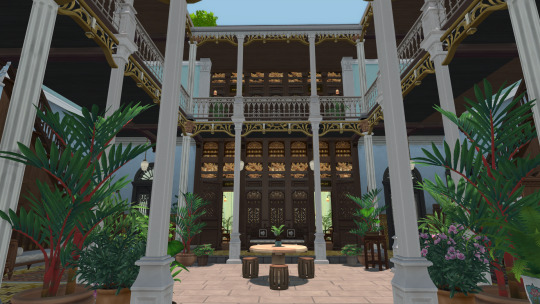
As is my custom, I aim for accuracy and fidelity to original architecture within game limitations, and this is no different. I'm loving how it looks so far, and this is a fun little project for now. Perhaps I might put this up on the gallery, as I am using mostly in game things, although it does contain CC, but not a whole lot, most important is just Felixandre's Fayun Sets.
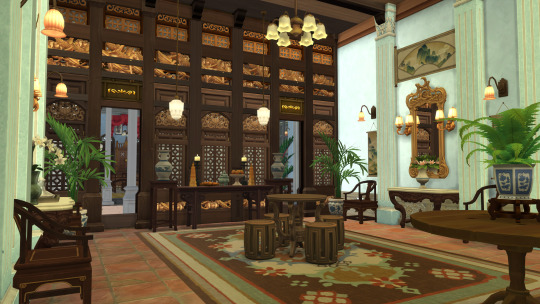

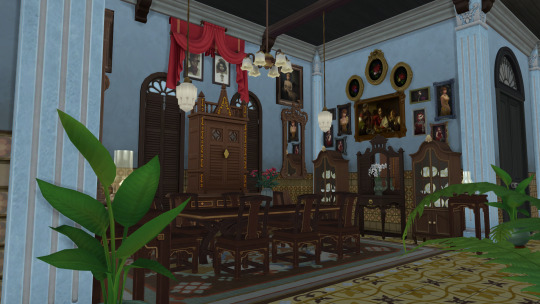
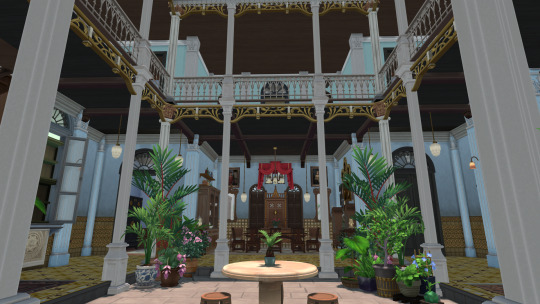
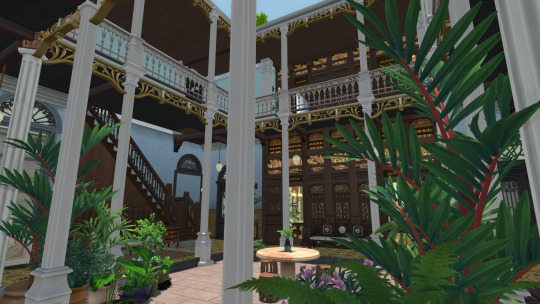


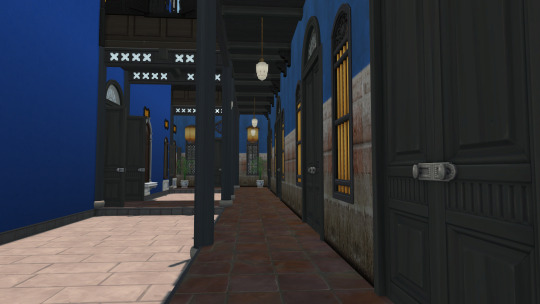
27 notes
·
View notes
Text
@DefiyantlyFree
Subscribe
In 2020 there was something called the Transition Integrity Project (TIP). It was a bunch of wargames that were set up by the most deep state Trump hating people you can imagine run by Rosa Brooks. Rosa Brooks is the former assistant to George Soros, she was a Pentagon official, she is Georgetown law professor, and she is a Democratic Party operative.
This nonpartisan TIP project was funded by Protect Democracy and United to Protect Democracy. Both of these were actually launched in January 2017 by former Obama administrative lawyers. One of those lawyers is former deputy White House Council Ian Bassin. They were formed as a resistance to the Trump administration.
In late June of 2020, TIP conducted a tabletop exercise using establishment democrats and the never Trump faction of the Republican party, such as Michael Steele to map out the realities of a potential coup by Donald Trump who would refuse to leave office.
This dark insidious project was documented and reported on by people like
@RaheemKassam
and
@MikeBenzCyber
and the war room but other than that, the mainstream media coverage of this was spotty at best.
The wargames were played out under the assumption that Donald Trump was a dictator who was going to consolidate power with his base of white supremacists who would need to be neutralized and eliminated after the election. Yes that was their language.
17 notes
·
View notes
Text

Techno Fascist mega-state advocated by Musk's grandfather Joshua Norman Haldeman encompasses North America from Greenland to Panama and beyond (into South America).
All information from here. (Same info below the cut)
A fantastic and extremely rare 1940 map depicting the geopolitical program of Technocracy, Incorporated, at the time an influential organization fueled by Depression-era anxiety, quack economics, isolationism and more than a soupcon of Fascism.
The map envisions much of the Americas and eastern Pacific basin as merged into a single “Technate of America”, to be ruled by a technically skilled, empirically-driven, non-partisan elite. The Technate is shown stretching from Greenland west to the International Date Line and south to encompass the Caribbean and parts of Columbia, Venezuela and the Guyanas. Its territory is colored red—the semi-official color of the Technocracy movement, also seen on its logo—and small, circular symbols indicate “Defense Bases” at its outer boundaries, as far afield as Attu; Pago Pago; Cape Farewell, Newfoundland; and Georgetown, Guyana.
The map is extraordinarily rare: I am aware of but one institutional holding and find no record of another having been offered for sale.
Technocracy Incorporated
The Technocracy movement had its brief heyday in the 1930s, its leading proponent engineer Howard Scott (1890-1970) and his Technocracy Incorporated, founded in 1933. The movement was ideologically somewhat diverse and fractious, but Scott’s version was fueled by the Great Depression and the crisis of capitalism, quack economics, post-First-World-War isolationism, and an infatuation with Fascist form and ritual. At the core of its ideology was a rejection of the “price system” underlying the global economy, in which money as a medium of exchange determines the value of goods and services and financial considerations are fundamental to all economic decision making. Citing the Depression as Exhibit A, movement adherents viewed this system as inherently unsustainable and predicted a total system collapse no later than 1940.
Technocracy Inc.’s prescriptive program had economic, political and geopolitical elements. At the core was a shift from the price system to what Scott called “an energy theory of value”, in which goods and services were to be valued based not on money but in terms of the energy inputs required to produce them. This in turn would necessitate the abandonment of democracy and the embrace of a technocracy—government by an unelected, technically skilled, empirically-driven elite with the expertise necessary to determine values and make rational resource-allocation decisions. The outward manifestations of this authoritarian outlook had a distinctly Fascist flavor: Technocracy Inc. members wore a uniform of double-breasted suit, gray shirt, and blue tie, with the red Technocracy logo worn on the lapel; drove gray-painted cars; and saluted one another in public.
As demonstrated by the map offered here, Technocracy, Inc.’s geopolitical program was simultaneously expansionist and isolationist. It called for a “Technate” consisting of a union of the nations of North America, Central America, the Caribbean and northeastern Pacific, along with the northern tier of South America. The rationale was that “the natural resources and the natural boundaries of this area make it an independent, self-sustaining geographical unit.” (The Technocrat, vol. 3 no. 4 (Sept. 1937), p. 3) In keeping with Technocracy Inc.’s authoritarian tendencies, the Technate would ensure its security by enacting a “Continental integration and mobilization”, and “complete conscription of men, materials, machines, and wealth by the government of the United States”, which were to be “placed before all other objectives of the American peoples” (The Technocrat, vol. 9 no. 3 (Apr. 1941).
Key to this project was the construction of a chain of far-flung “defense bases” along the Technate’s borders, as shown on the Technate of America map offered here. Behind these the Technate would be entirely secure, its economy “self-sustaining” and independent of global trade, and its defenses sufficient to deter would-be invaders. As such, it would have no need to become involved in the conflicts of either Europe or Asia.
“Opposition to American entry into the wars raging outside our Area is a keystone of Technocracy’s current basic policy. Lest that policy be mis- construed by uninformed persons in the public, Technocracy points out that this position is not held on the basis of humanitarian or pacifist tenets. America is worth fighting for! But we need fight for America only on American terms and from our own Continental defenses. Competent strategy will keep war out of our Area.” (Ibid.)
As with the broader isolationist movement, Technocracy, Inc. had its legs cut out from under it by the attack on Pearl Harbor, the subsequent entry of the United States into the Second World War, and the nation’s near-total mobilization to fight the good fight against Fascism, all within a democratic, capitalist framework. Nevertheless, the organization survives to this day, with a web site, membership and online meetings.
In all, an extremely rare and interesting artifact of this quirky-but-influential Depression-era intellectual and political movement.
References
OCLC 10502189, giving a single holding at the Wisconsin Historical Society (May 2022). OCLC 54645553 describes a very large (ca. 40” by 60”) map, The Technate of North America: The Minimum Area for the Maximum Defense and Efficiency (1941). It may be this map that is visible in a photo of Howard Scott at what appears to be a Technocracy Inc. office.
8 notes
·
View notes
Photo

Lovely Georgetown // #georgetown #texas #architecture #townsquare #project #williamsoncounty #filmphotography #documentary #film #mediumformat #hasselblad500cm #ilford #hp5 #filmshooterscollective #texasgirlphotography https://www.instagram.com/p/Co7Vc36u0MC/?igshid=NGJjMDIxMWI=
#georgetown#texas#architecture#townsquare#project#williamsoncounty#filmphotography#documentary#film#mediumformat#hasselblad500cm#ilford#hp5#filmshooterscollective#texasgirlphotography
1 note
·
View note
Text
Matt Shuham at HuffPost:
Donald Trump has no greater enemy than the United States’ federal bureaucracy — what he calls the “deep state.” And he has a plan to bend it to his will if he’s elected in November. The plan, to create something called “Schedule F,” would make tens of thousands of civil servants easier to fire, fundamentally changing the nature of the federal government — and, some worry, paving the way for authoritarianism.
Schedule F is a new category, or schedule, of federal workers who are exempt from codified job protections, like being hired and fired based on merit and having the ability to appeal disciplinary action. The majority of federal civil service employees, from climate scientists to bank examiners to IT specialists, are covered by these protections; some positions, like postal workers and intelligence officers, are currently exempt. That system ensures that experience and skill, rather than political favoritism or personal connections, guide hiring and firing decisions within the federal government. But conservatives have long complained that the president should exercise more control over the federal bureaucracy, and Trump in particular has said it needs to be “brought to heel.” Trump created Schedule F in an October 2020 executive order. Under that order, federal workers involved in “confidential, policy-determining, policy-making and policy-advocating positions” — a vague description that would include at least tens of thousands of people — would be stripped of their civil service protections and reclassified as “at-will” appointees, meaning they could be hired or fired for any reason, or none at all.
Because the order came so late in Trump’s presidency, only a handful of agencies created lists of specific jobs that would be eligible for conversion to Schedule F. And President Joe Biden reversed the order before any jobs could actually be converted. But Trump has explicitly said he’ll pursue Schedule F again if he’s elected. In a campaign video last year, Trump referred to Schedule F as an effort to “remove rogue bureaucrats.” “I will wield that power very aggressively,” he said.
Federal employees, political scientists, union leaders and watchdog groups told HuffPost that Schedule F could lead to a “chilling” effect. At-will employment, they said, would make it harder for government workers to raise concerns that go against their bosses’ political loyalties. That could lead to a degradation of public services like disaster relief, financial regulation and the administration of government benefits. “You can see where it can grind work to a halt, because even people who are trying to do the right thing [would] be afraid that if they do something wrong, they’ll be out of a job,” said Joe Spielberger, a policy counsel at the Project on Government Oversight who has raised alarms over how the implementation of Schedule F would harm key welfare programs like Social Security, Medicare and Medicaid. Schedule F would be the “fundamental element of an authoritarian agenda,” he said, allowing Trump to take control of the vast federal bureaucracy and reverse generations of reforms.
Donald Moynihan, a professor of public policy at Georgetown University, signed on to an open letter in April arguing Schedule F would open the door to “politicization and patronage throughout the federal workforce.” He told HuffPost, “This feels like the biggest problem that the fewest people understand about a potential second Trump administration.”
[...]
The ‘Lightbulb Moment’
The push for Schedule F started with what one Trump staffer called a “lightbulb moment.” In 2019, James Sherk, a top White House adviser on civil service and labor policy, was frustrated by reports of federal workers pushing back against the Trump policy agenda. He started reading through existing U.S. law on federal labor rights, and realized that the language about exceptions from civil service protections could actually be interpreted quite broadly. Such a change in interpretation would be a break from decades of precedent. Presidents only bring around 4,000 political appointees with them at the start of a new term, and many additionally require Senate confirmation. These appointees are generally classified as “excepted” — they aren’t required to complete standardized competitive civil service exams, but they also aren’t afforded standard civil service protections. (The “excepted” portion of the federal workforce includes more than a million federal workers under various schedules, though the vast majority of them come from the United States Postal Service, the military, and Department of Veterans affairs.)
But Sherk argued that the “excepted” service should grow much larger, to include “the most important” federal workers — “the people who are telling all the rest of the bureaucracy what to do,” he said in a 2022 interview. In his view, the change would make the federal government more accountable to the White House, and therefore, the American people. “Nothing in [federal law] says that you can only take away the civil service protections of political appointees,” Sherk said. Sherk estimated that Schedule F would have applied to 1% to 3% of the federal workforce, or about 50,000 workers, had Biden not unwound it. But the number actually affected if Trump pursues Schedule F again could be much larger. A Government Accountability Office review of the few agencies that did start making Schedule F conversion lists found that agencies thought anywhere from 2% to 68% of their employees were eligible to be “rescheduled.”
[...]
Project 2025, the 900-page right-wing agenda-in-waiting for Trump cooked up by the Heritage Foundation and dozens of other arch-conservative organizations, refers to plans to reintroduce Schedule F in several sections. And one member of the project’s three-person leadership team is Paul Dans, the former chief of staff at the OPM during the Trump administration. The Project 2025 team has signaled that potential staffers in a second Trump White House would need to be on board: A questionnaire for potential new hires in a Trump administration asks applicants if they agree that “the President should be able to advance his/her agenda through the bureaucracy without hinderance from unelected federal officials.”
HuffPost has a story on how Project 2025 and Schedule F could chill dissent against a potential 2nd Trump.
This is why Americans should vote Joe Biden to stop Project 2025 from taking effect!
Read the full article at HuffPost.
#Project 2025#Schedule F#Donald Trump#Trump Administration II#Authoritarianism#Civil Servants#Civil Service#Paul Dans#The Heritage Foundation#James Sherk
15 notes
·
View notes
Text

In addition to AI, the 10 Million Names Project is employing oral histories and archived documents to help identify 10 million enslaved people in pre- and post-colonial America.
When journalist Dorothy Tucker first learned about the 10 Million Names genealogical project, it helped amplify memories of long car journeys from Chicago to “Down South” in the 1960’s, where her mother’s family owned land.
The Mississippi property purchased by her great-grandfather George Trice in 1881 was special for several reasons. First, nobody’s really sure how a formerly enslaved man was able to purchase 160 acres, but Trice came up with the $800. And every time Tucker and her family drove down to Shannon, Mississippi each summer to visit relatives, it was more than just a vacation.
“I'd wake up in the morning and have breakfast at my aunt's house. I'd go a few feet down the road and have lunch at my great-aunt's house. And then I'd play outside at my cousin's house,” says Tucker, an award-winning investigative journalist with CBS2 WBBM-TV in Chicago. “It was that way all day long. Every house was owned by a relative. I thought everybody lived like this. I thought everybody had land and stuff that was theirs.”
Tucker finally got specific details about how and why that land was purchased during the final months of her term as president of the National Association of Black Journalists. In early 2023, NABJ Board Member Paula Madison, a retired NBC Universal executive, informed the group about an offshoot of the Georgetown Memory Project, the initiative that unearthed information about the 1838 sale of enslaved Africans to fund Georgetown University. The 10 Million Names Project was created to recover the names of an estimated 10 million men, women and children of African descent who were enslaved in pre- and post-colonial America between the 1500’s and 1865. By engaging with expert genealogists, cultural organizations, and family historians both Black and white, the initiative hopes to provide more African Americans with information that only formally began to be captured for their ancestors in the 1870 United States Census.
Up until that year, enslaved Africans and their descendants were only acknowledged as the property of their owners. If their existence was noted, it was in the form of sales documents or as catalogued property in civil records. Also, the relatives of enslavers often maintain troves of information about those purchased and sold off that would otherwise be completely lost.
(This database is helping to uncover the lost ancestry of enslaved African Americans.)
Much of the work will be dependent on oral histories passed down thru generations of families, and researchers of the 10 Million Names Project also hope that more white families will aid in the search by making familial records, like letters and pages from family bibles, available to them.
Tucker, who ended her term as NABJ president during that organization’s annual conference in August, revealed at the awards banquet in Birmingham, Alabama that she’d been able to learn more about her great grandfather’s real-estate ventures, through a collaboration between NABJ and the New England Historical Genealogical Society’s American Ancestors initiative.
The 10 Million Names Project was formally launched at the convention. Tucker considers it an especially timely parting gift to her journalistic colleagues. As societal divisions along racial lines widen, hate crimes continue, and attempts to ban books and curtail African American studies programs in schools and universities increase, strengthening historical knowledge is urgently important for Black Americans, Tucker says.
“I think that the ability to tell these stories and to know them is so critically important,” she says. “When you know your personal story, then as a journalist, it gives you the perspective to dig deeper when you're doing the next story, whether it’s about the school board or about Ukraine or the next elections. You know, these stories are all tools that are really good for all of us.”
How the initiative evolved
The man who is the catalyst for the Georgetown Memory Project and 10 Million Names says he’s never really been interested in investigating his own family tree.
“To me, genealogy was sort of like butterfly collecting,” says Richard Cellini, a faculty fellow at Harvard University and founding director of the Harvard Legacy of Slavery Remembrance Program. “It’s impressive because of the amount of effort invested into it. But I never quite understood the point.”
Cellini was born in 1963 in Central Pennsylvania to a Penn State University professor and homemaker mother. His Catholic upbringing steered him to Georgetown University and an eventual decade-long law career before pivoting toward the software and technology realm. In 2015, Cellini learned that his alma mater had formed a working group to explore the sale of 272 men, woman, and children in 1838 to rescue the university from bankruptcy. As a white American of European descent, he says he did not live with or know many Black people growing up, going to school or during his legal and technology careers, so the initiative opened a window in his mind.
When Georgetown President John DeGioia invited alumni to weigh in, Cellini wrote an email asking one simple question that had nothing to do with the university. He wanted to know, “What happened to the people?”
Cellini says a senior member of the working group wrote back to say that research had concluded that all of the enslaved men, women, and children had died fairly quickly after arriving in the swamps of Louisiana where they had been transported.
“And I remember just staring at that email, even though I didn't really know much about the history of slavery or African American history, and just thinking that just doesn't make any sense,” Cellini says. Curiosity drove him to form an independent research group, funded initially through his own credit card and then from other Georgetown alumni who eagerly offered financial backing. To date, the Georgetown Memory Project has fully identified 236 of the 272 enslaved people sold by the university's leaders. Of those identified through archival records, the project has verified more than 10,000 of their direct descendants.
“The 1838 slave sale at Georgetown brought home to me, again, they were real people with real families and real names,” Cellini says. “More than 50 percent of them were children. William was the youngest, and he was six months old. And Daniel was the oldest at 80. Len was sickly, and Stephen was lame. I mean, this is all from the original documentation. From that moment on, I just couldn't get it out of my head.”
The gathering of history
The genealogists and historians connected with the project suggest that the richest vein of information may well be in the oral histories they’ve already begun gathering through hundreds of interviews. They contain fascinating stories like the ones that Kendra Field’s grandmother Odevia Brown used to tell about her African American and Native American forebears in Oklahoma. When Field was in high school, she never really liked history classes, but she always loved her grandmother’s stories.
“It wasn't until I got to college that I realized, thanks to a wonderful professor, that my grandmother's stories were history,” Field says. After the death of her father, Field began to travel back to those historically Black Oklahoma towns to explore her African American and Creek Indian heritage. Now in her career as a historian, author and professor at Tufts University, Field also has taken on the role of chief historian for 10 Million Names.
Technology, including the use of artificial intelligence programs, is allowing project investigators to do quicker, more efficient searches for information. Field says that can happen by identifying the location of plantation ledgers, advertisements, and receipts from auctions. “Particularly, there's been a lot of advancements made in optical character recognition, which allows researchers to identify names and handwritten records,” Field says.
Prior to this, a researcher had to find the document, transcribe the information, and then pivot to another database to go deeper. But with the development of other genealogical data sets such as Enslaved.org, locating individuals and making connections becomes much easier. “So that means we can move closer to that 10 million much more quickly than we would have been able to even a decade ago,” Field says. Also, the collection at the Library of Congress, “Born in Slavery: Slave Narratives from the Federal Writers' Project, 1936 to 1938” has yielded important clues from the estimated 2,300 people interviewed during that project.
(The search for lost slave ships led this diver on an extraordinary journey.)
Though identifying 10 million people who were never meant to be known as human beings may sound like a staggering task, the people behind the initiative believe it’s a totally attainable goal—even amidst all the current cultural and ideological turmoil in American society. That’s because, Cellini says, there are certain inalienable truths in this world.
“John Adams said that facts are stubborn things. You know, our Black brothers and sisters have always known their history and white people have always tried to prevent Black people from learning that history. What's new here is that white people are now trying to prevent other white people from learning this history.”
Cellini believes that Black Americans aren’t the only ones who want or need to know the full story. “It's white people who hunger for knowledge of that history, as well. It’s our duty to engage in determined resistance, to strike repeated blows for the truth. And nothing is more stubborn than facts.”
And like journalist Tucker, Cellini believes the search is infinitely for the benefit of the whole of society.
“The hard part isn't the finding,” Cellini says of the effort. “The hard part is the looking. But when we look, we find. And when we find, the whole world changes.”
#Africans#Black Lives Matter#Black Lineage#american freedmen#Black Freedmen#Black Americans#10 million enslaved Americans' names are missing from history. AI is helping identify them#10 million names project
41 notes
·
View notes
Text
For those who prefer to read on tumblr over AO3, here is the newest chapter I posted today! I'll be posting in both places to get maximum eyes on the work. Now do enjoy, because I made myself horny on the LORD'S DAY to write this, as Skippy would have wanted!
(tagging those who showed love on the original post! @itsalinh, @fanfic-keeps-me-sane, @alexgraphyy, @arrpegio, @hawklovesskippy)
Here are some important visuals for you lovely readers: Picture 1950s Hawk and Tim for the 2012 flashbacks, okay? That innocent little dorky Skippy smile melts my fucking heart. And I personally find Hawk to be very daddy in the 50s (before he was actually even a daddy). I'm thinking up titles, and I have a playlist of songs going that will inspire certain chapters of the book, so chapter titles will be coming soon as well with lyrics of songs that inspired each installment. Gird your loins, we're jumping right into some light to medium smut. ***
The loud music thumped in Tim’s ears as he pushed through the crowded bar. It was the first weekend of his graduate program at Georgetown and he, against his better judgment, agreed to meet up with some classmates he met at orientation. He never went out much in undergrad, mostly opting to stay in his dorm room and study or catch up on his shows while his other peers stumbled through the streets of the small college town.
Now that he had one degree under his belt, he felt like it was time to be a damn adult and see what the bar scene was like in his new city. Besides, at least he was now 21 and didn’t get that pins-and-needles feeling across his skin when he handed a bouncer his ID. Even if his fake that he’d acquired through his freshman roommate did look enough like him and he had memorized the address and date of birth of the man on the card, it still made him extremely squirrely and anxious and usually resulted in ducking out of the line and telling his friends he forgot he had work he needed to catch up on.
The bar was dark and filled with bodies, Tim’s brow already beginning to sweat as the music pulsated with his heartbeat. He finally shoved his way up to the bar and shouted for the bartender to bring him the same beer the guy before him had just ordered. He set down enough cash to cover the single beer as well as a tip, and turned his back toward the bar.
Tim leaned back against the counter, elbows propped up behind him on either side. He perused the crowd for anyone he recognized from orientation this past week. His gaze failed to fall upon any familiar faces, but he did catch the eye of another man across the bar. His heart leapt into his throat and he took a sip of the amber colored ale to try to push it down.
The man was older than him by at least ten years. This was not a concern for Tim, as most of his past lovers were well above his own demographic. The man was sipping his cocktail through the skinny black straw bobbing over the top of the drink. His blue eyes were locked on Tim, and Tim could feel his cheeks getting hot.
He subtly tried to look to his right and left to make sure that the man’s eyes were, in fact, trained on him. The man removed his lips from his drink and one corner of his mouth drew upward, indicating that Tim’s attempt at being covert had definitely failed. Tim let out a breathy chuckle to himself and threw the man a wink. Taking this as an invitation, the man began to walk towards him.
Tim pushed his back off the bar and began walking to meet the man on the dance floor. Though he did not go out much to the college bars with his friends over the past four years, he had plenty of experience meeting men in bars around his hometown. He knew the game and he had to admit, he played it well.
The man’s eyes never broke contact as they squeezed through a sea of bodies to get to one another. Once they reached each other in the mass of drunken college students, the man leaned down into Tim's ear, and just loudly enough over the music, said, “Your lips look so pretty wrapped around that beer bottle.”
Tim’s breath caught in his throat at the man’s forwardness. He’d encountered many a pickup line, but none that sent the blood rushing from his head and into his pants quite like that one. The man towered over him by at least 5 inches, to where Tim had to crane his neck up to meet the man’s gaze. Using his thumb and forefinger, Tim adjusted his thick framed glasses and on tiptoe, he placed his mouth right next to the man’s ear. His voice came out deeper than he expected, and thank God, because inside he felt his heart squealing like a little girl.
“So you think I’m pretty?”
With his one free hand, the man grabbed Tim’s waist and pulled him close. Tim was pleased with his choice of words, as he could now feel the man’s hard-on pressed against his leg. It took every ounce of self control Tim had not to rip this man’s clothes off in front of all these people. The man read Tim’s mind, or perhaps recognized the animalistic look in Tim’s eyes, as he grabbed Tim’s hand and began leading him off of the dance floor.
Once they reached the edge of the crowd, the man wasted no time before setting both of their drinks down on an empty table and pushing Tim against the nearest surface, which was the wall next to the men’s bathroom. Tim’s back was against the wall with the man’s massive hand cradling the back of his neck. The man used his other hand to place it under Tim’s stubble and tilt his chin up until their lips were millimeters apart, both men breathing heavily.
“Do you do this often?” Tim asked breathily. “Cruise for younger men at the college bars?”
“Ouch,” the man had a pained expression, though the sultry smirk never left his lips. “How old do you think I am?”
Tim gently nipped at the man’s neck, trailing light kisses upward until he reached the man’s ear. “Old enough to know better than to start something unless you want to finish it.”
The man pressed his hips against Tim’s, closing the space between the two of them and kissing Tim so deeply that he nearly choked on his breath. “How about this,” the man said as he pulled away from Tim’s desperate lips. “I’m gonna go close my tab, and when I get back here, if you’re still here, I’d like for you to come home with me.”
Tim rocked his hips against the man one more time before pulling away, “I’ll go get us a cab.” The man practically growled in Tim’s ear, placed a sloppy kiss just below Tim’s earlobe, and turned his attention back toward the crowded room. Tim watched as the man’s broad, muscular shoulders and back towered over the tiny women he had to push through to get back to the bar. He felt a surge of pride as he watched these college girls ogle at the man he was about to go home with. If only they knew, he thought, that the man’s stature clearly translated to other things of impressive size, if the feeling against Tim’s thigh had been any indication.
Tim finally tore his gaze from the man as he turned and exited the back door of the bar. As he stepped out into the hot August night, his ears still ringing from the loud music, he looked down the street and held up a hand to hail a taxi. A handful of other people were on the curb trying to do the same, a group of raucous frat boys jumping in the first cab that pulled up. Just as well, Tim thought. His suitor had not met him out back yet anyway.
Just then, the back door of the bar opened and his conquest emerged into the dark night. It did not require many strides of his long legs before he was back in front of Tim, grabbing his face and driving their lips together. The man’s lips were hot on Tim’s as he closed the space between their bodies once again. Tim felt something twitch in his pants at the thought of onlookers in this dark alley behind the bar, watching the two men, all hands and lips and teeth.
The man leaned down to kiss and bite at Tim’s neck, just above the collar of his shirt. While the man was sucking and licking at a spot of his skin, Tim took in the surroundings. He was sure the man was going to leave a mark, but he would be lying if he said he wasn’t enjoying a bit of voyeurism. Groups of girls whispering as they passed the men, missing available taxis that passed by because they were too busy in their moment of passion.
Then, Tim saw a man leaning up against the back door of the bar, having a smoke just under the bright security light that lit up the back alley. With two fingers, the stranger removed the cigarette from between his lips as he kept his eyes locked on Tim, his expression unreadable. Tim threw his head back as his own stranger placed his hand on his ass, clawing desperately at the smaller man. The man with the cigarette ashed it on the brick wall of the bar, ran a hand through his hair, and folded his arms. He wasn’t even pretending not to watch. He was enjoying the show that Tim was putting on for him.
Tim created a fantasy in his head of the stranger joining himself and his suitor in the back of the cab, the three of them fervently swapping sloppy kisses on the way to the original man’s home. Though he already had one man locked in for the night, the man who was whispering absolute filth in Tim’s ear about all the things he wanted to do to him, Tim couldn’t help but imagine what it would feel like to have the two men worshiping his body at once. The dimly lit stranger shifted on his feet, appearing to become uncomfortable at the tightness in his own pants.
The fantasy world Tim had created was fractured when his suitor pulled away and finally flagged down a taxi. He opened the car door for Tim like a gentleman and slapped Tim’s ass as he climbed into the back seat. The man told the driver the address of their final location for the night. As the cab began pulling away from the bar, Tim watched as the stranger stomped out his cigarette, turned on his heels, and disappeared into the dark of the night.
#professor hawk#hawk x skippy#hawk and skippy#hawk and tim#hawkins fuller#tim laughlin#tim x hawk#hawk x tim#fellow travelers
15 notes
·
View notes
Text
Final chapter. With the house all to themselves for a few hours, Alex and Henry make the most of their alone time.
Chapter 9 preview:
It wasn’t long before they were upstairs. Even less time for them to shed their clothes and for the covers on Alex’s bed to be pulled down. Soon enough, Henry was on his back. He shone like the North Star against the dark blue fitted sheet of the mattress. The sight of him like this took Alex’s breath away. And sent all the blood in his body straight to his cock.
“You still wear it.”
Henry reached for the key that hung around Alex’s neck. It unlocked the front door to the family home in Austin, Texas, where Alex had grown up. His mom hadn’t been appointed a federal judge until his senior year of high school. By then, Alex had already been accepted early into Georgetown University. The summer before he started college, he helped his parents pack up the house instead of bumming around Europe with Nora like he had wanted. Part of the reason he had teased his mom about doing a gap year after graduating from college.
“Of course.” Alex fingered the key. “Did you think I wouldn’t be?”
“Three years is a long time.”
“Too long.” He took the hand Henry had extended and kissed each finger along with his thumb.
Read more on AO3.
#red white and royal blue#rwrb#rwrb fic#alex claremont diaz#henry hanover stuart fox#christmas au#christmas romance#second chance romance#christmas eve#my fic#am writing#ao3 author#ao3
4 notes
·
View notes
Text
Band Recommendations | HAPPY NEW YEAR!!
Bastro was the more prominent of guitarist David Grubbs' two immediate post-Squirrel Bait projects (the concurrently running Bitch Magnet being the other). Grubbs originally joined the Louisville, KY-based Squirrel Bait while still in high school, and was actually one of the oldest members of the group; when he and bassist Clark Johnson left for college, it effectively spelled the end of the band after two important releases. Grubbs went to Georgetown University in Washington, D.C., and formed an early version of Bastro in 1987 with bassist Dan Treado, who soon left. Even though Clark Johnson had gone to Chicago, he and Grubbs reteamed as the new core of Bastro, and pursued a more twisted and abrasive style of post-hardcore punk than their former band. Backed by a drum machine, they issued a six-song EP, Rode Hard & Put Up Wet, on the Homestead label in 1988. They subsequently played some tour dates with My Dad Is Dead, whose drummer at the time was Oberlin College percussion major John McEntire. McEntire wound up joining Bastro full-time for their LP debut, 1989's Bastro Diablo Guapo, which drew comparisons to the blistering extremity of Steve Albini and the precision and shifting dynamics of another Squirrel Bait offshoot, Slint. Their second full-length, 1990's Sing the Troubled Beast, found the group straining against their established blueprint to follow a relatively subtle and melodic path. Bassist Johnson subsequently left the group and was replaced by Bundy K. Brown; meanwhile, Grubbs relocated to Chicago to attend graduate school. Feeling limited by the extremity of their power-trio format and afraid of stagnating, Bastro tried to push into more atmospheric territory, and wound up deciding to retire the name altogether and continue as a completely different project, dubbed Gastr del Sol. Brown and McEntire appeared on Gastr del Sol's 1993 debut, The Serpentine Similar, after which the group became a vehicle for Grubbs' collaboration with Jim O'Rourke, as well as a touchstone of the post-rock movement. Brown and McEntire subsequently became charter members of the even more seminal post-rock outfit Tortoise.
2 notes
·
View notes